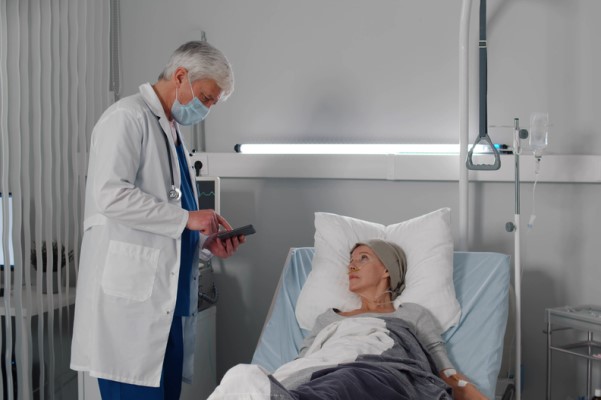Ask an Oncologist: How Often Should I Have Cancer Screenings?

Choosing the right oncologist is important. This type of medical professional focuses on diagnosing and helping cancer patients. Cancer screenings are necessary for lowering the chances of getting a cancer diagnosis. If you want to know how often you should have cancer screenings, here are the details from an oncologist.
What cancer screenings are
Cancer screenings aim to catch cancerous cells at early stages. This early stage of cancer is still treatable. Treatments for early-stage cancer are easier for the patient. Some types of cancer screening tests can lower the death rate from specific cancers. These tests can also help find any pre-cancerous cells in asymptomatic or healthy individuals.
Frequency of cancer screenings
The frequency of cancer screenings depends on the risk level of an individual. Discussing one’s health history and family health history with the oncologist can help determine a person’s risk level for developing cancer. The information from this probing interview will result in a custom-fit cancer screening. The oncologist will also determine which type of cancer screening the patient should have.
Mammograms and MRIs for breast cancer
Breast cancer screenings can find cancer in its earliest stages. Mammograms are standard screening tests for women with an average to moderate risk of getting breast cancer. Having a mammogram every other two years is standard. This also depends on the patient’s age.
Those at high risk to very high risk for this cancer must have an annual mammogram and MRI. These tests must have a six-month interval. Very high-risk women have the gene mutation for breast cancer. Even if these women have no family history of cancer, any of them could still be at risk of developing it.
Pap smear for cervical cancer
Pap smears and HPV testing are can detect any abnormal cells in or around the cervix area. Women ages 21-65 years old must have Pap smears every three years. Women ages 30-65 can also have combined testing of HPV testing and Pap smear every five years. Studies show that combining Pap smear and HPV vaccines has decreased the growth rate of cervical cancer.
Colonoscopy for colon cancer
Colonoscopy can detect the growths in the large intestine or colon. People who have no family history and are in good health should have a screening every 10 years by 50 years of age if there are no polyps. Those with a family history of colorectal cancer must have a screening by 40 years old. Then they should repeat it every five years.
Digital rectal exam (DRE) or prostate-specific antigen (PSA) test for prostate cancer
Every man should discuss this screening with an oncologist at 50 years old. These men are at average risk and expect to live on for at least 10 years more. High-risk men who have a close relative with prostate cancer must have this conversation with the oncologist at 45 years of age. Those at very high risk should start the PSA and DRE exams by age 40.
Low-dose CT scans for lung cancer
An oncologist will recommend this cancer screening test to people 55-80 years of age with a 30-pack per year smoking history and those who are still smoking. The low-dose CT scans must continue every year, twice a year, or every three months if there is a nodule. The frequency will depend on the size of the nodes or nodules. Early scans can help catch cancer at its early stages.
Other cancer screening tests
The attending oncologist can recommend any cancer screening test to confirm a suspected growth. Any area of the body can develop cancer even if an individual does not have a family history of cancer. People with high risk should follow the oncologist’s advice on which cancer screening tests to take and how often to take them. Below are other cancer screening tests available:
- Alpha-fetoprotein blood test can detect early stages of liver cancer in high-risk individuals
- MCED (multicancer early detection) tests can measure tumor markers in body fluids
- A virtual colonoscopy helps an oncologist see what is happening in the rectum and color from outside the body
- CA-125 test often works well with transvaginal ultrasound and can detect early stages of ovarian cancer
- A clinical breast exam is a routine exam performed by an oncologist, the family doctor, or the patient themselves to detect lumps or changes in the breasts
Getting a cancer screening from your oncologist is a good way to ward off or fight cancer
Cancer can be a silent killer. It can damage specific parts of the body in a random manner. Early detection can start early treatment. Knowing your personal cancer screening from your oncologist can help you prepare for it.
Get more information here: https://lindenbergcancer.com or call Lindenberg Cancer & Hematology Center at (856) 475-0876
Check out what others are saying about our services on Yelp: Oncologist in Marlton, NJ.
Recent Posts
When most people think of cancer treatment, they think of chemotherapy. However, this is only one of many treatment options available. An oncologist can provide personalized cancer treatment that aims to remove and kill the cancer, as well as to prevent it from coming out of remission.Cancer treatment is not one size fits all. An…
Anemia occurs in people who lack enough healthy red blood cells and hemoglobin to carry oxygen to each organ. It has many forms and causes, all of which can be short-term or long-term. Fortunately, a hematologist offers multiple treatment options to address all concerns.When one's red blood cells do not work properly, anemia usually follows…
Blood disorder specialist treat and diagnose blood disorders, from anemia to leukemia. Regardless of whether a patient has a cancerous or noncancerous blood disorder, consulting one of these specialists can lead to better health outcomes. A specialist will work to find an effective treatment that prevents the disorder from progressing, as well as work to…
Oncologist are known as cancer doctors or specialists who diagnose and treat various types of cancer, meaning people should not wait until there is a suspicion of the disease before scheduling an appointment. In fact, with cancer, timing is of the essence. Patients with any concerns can learn how regular visits to an oncologist can…


